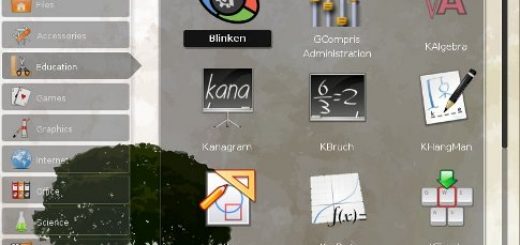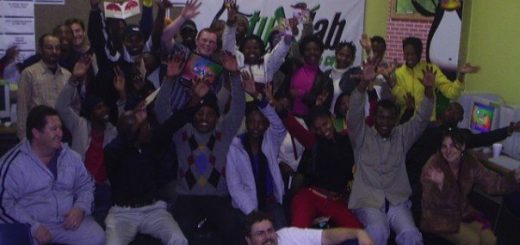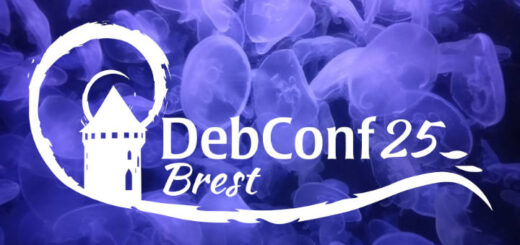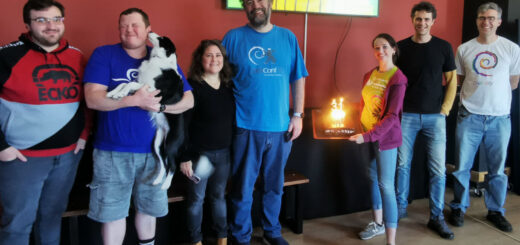Renewed enthusiasm for Edubuntu
Renewed Enthusiasm
Recently I’ve been wondering if I really want to be involved with Edubuntu or not, I blogged about it, and have been talking to Jordan Mantha about a lot of the issues we have had. I also booked a ticket to Barcelona for the Ubuntu Developers Summit, so that we could get a few people together to figure out how we can make Edubuntu a good choice for educators and something that people will be happy and proud to contribute for. I was very pleased when I applied for accomodation sponsorship and Canonical said they’d pay for accomodation and my flight tickets (thanks Canonical, it’s very much appreciated), but I think I’m even more excited about the renewed energy in the Edubuntu community. In just the last two weeks we’ve had a surge in enthusiasm and new people dropping by being *very* eager to participate and contribute. It creates a problem where we have too many ideas and some people who are new who want to get something into Edubuntu but who don’t quite understand how Ubuntu’s processes work yet, but I’m not complaining, I think it’s great that people care about Edubuntu again, and we have ideas on how to get around those problems.
Ideas
I thought I’d jump right in and mention some of the things that we’ve been discussing recently. Currently, Edubuntu has just been an add-on CD with packages for an Ubuntu installation. There’s plenty of good reasons for this, such as the amount of space available on a CD (Ubuntu already fills a disc so you have to remove things in order to add anything else), being desktop agnostic, etc. However, the feedback that we received suggests that most people prefer a full distro installation.
We’re not sure how it’s going to happen yet, but we’re probably going to have full releases again that can be installed via DVD or USB disk. Plenty of people have stressed how important it is to be able to demo Edubuntu properly. We’re also going to be looking at getting an LTSP instance in the live environment, which will be a challenge doing it right but will also aid in demo’ing LTSP.
We also want to work better with upstream projects. It’s been stressed in Ubuntu and upstream projects how beneficial a good relationship between Edubuntu and the upstream projects can be. Edubuntu will aim to make Ubuntu (and hence the Edubuntu system) a great distribution for running KDE Edu, Sugar, Moodle an easy to use school LAMP stack and more.
We also want to integrate better with all the desktop environments. Gnome has great usability features, which makes it a good option in educational environments, but it consumes resources relatively heavily compared to Xfce which offers fairly good usability as well. Besides that, there are even lighter environments such as LXDE which runs very well on very old hardware. The improvements since KDE 4 can’t be ignored either, plasmoids for example has lots of potential in education, and considering that KDE-Edu uses KDE and QT libraries, it makes good sense to use KDE in an educational environment . We want Edubuntu to be able to easily integrate with the major desktop environments, even the Ubuntu netbook remix. Whatever the user’s choice of desktop is, we want to integrate the best that the free software world has to offer in terms of education for that environment on Ubuntu.
Also in big demand is ease of use. People keep requesting that things are easier, and that Edubuntu, Ubuntu and LTSP is in need of better documentation. We’ll keep this in mind with the changes and plans we introduce over the next few releases, and do our best to make sure that what is put out there is as supportable and intuitive as it could be.
How we see this happening
What’s mentioned above is certainly not going to happen in one release, and some of the things may take many releases to get just right. We’re considering keeping the Edubuntu distro releases as only LTS, and not releasing any other releases inbetween. This way we have to worry less about constantly testing discs and focussing more what’s on there. Perhaps add-on discs will still ocur for every release, there’s some detail there we still need to flesh out.
The plan is also to have various PPA archives available in the edubuntu-dev PPA, some for experimental or hacky code that might not be quite ready for Edubuntu, as well as stable updates for Edubuntu that can be installed with confidence by users. We’re mostly going with PPA’s initially since we only have one core-dev. Hopefully that will change over time but for now the PPA’s should work as a good interim solution. There might also be community spins for very specialised installations, but we don’t want to dilute Edubuntu too much so it’s something we still have to consider.
Everybody’s Welcome
Bringing the best of education and education-related technologies to Ubuntu means that we have to extend out to others doing similar work, whether it’s K12-LTSP, Skolelinux, Guidalinux-EDU, Debian-edu, OpenSuse-edu, etc. In my opinion we can learn a lot from them, and if they are having any kind of problem that we have dealt with already, then we should give them a hand as well.
Actually, I can’t say it better than Jordan Erickson, read his message sent to edubuntu-devel earlier here.
It is our goal to make Edubuntu easy and worth while to contribute to. If you’re interested in becoming involved, you are absolutely more than welcome to introduce yourself on the edubuntu-devel mailing list or joining us on the #edubuntu IRC channel.
PS: I haven’t slept much the last 2 days, so if things don’t make sense, I’ll try to clear it up later!








Why no mention of DebianEdu in this post? Have you even considered merging Edubuntu into DebianEdu?
Hi foo, I didn’t intentionally leave it out. I thought that Debian-edu = Skolelinux. I see on http://wiki.debian.org/DebianEdu that there is some differentiation between the two though, sorry about that.